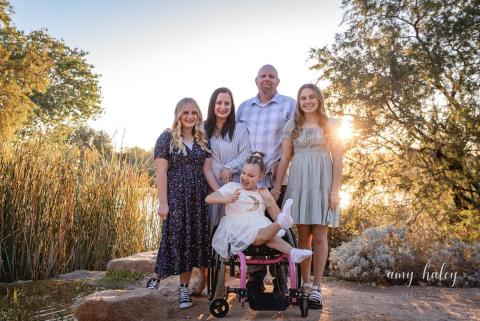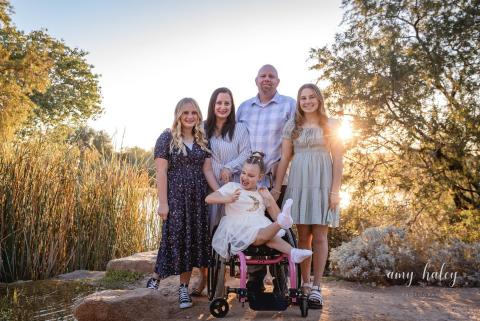
Traveling can be a positive way for kids to learn, explore, experience new things, and of course, spend quality time with loved ones.
Planning a vacation can be more difficult for families with children who have special or complex medical needs. Brittany Miller is the mother of Brooke, a 12-year-old girl who sees specialists at Phoenix Children’s Hospital. Their family learned how to plan a successful and safe trip while also managing Brooke’s complex medical needs.
“We weren’t always traveling, and it took years before I felt comfortable taking care of all of Brooke’s medical needs. I have to admit I was really nervous and scared to take the plunge,” Brittany says. “Thankfully, the invaluable training provided by the medical team at Phoenix Children’s Hospital helped me feel confident in caring for Brooke.”
Brittany is also a member of the Patient Family Advisory Board for the Barrow Neurological Institute at Phoenix Children’s Hospital. Here, she shares tips for traveling with children who have complex medical needs with Dr. Wendy Bernatavicius, division chief of primary, complex care, and adolescent medicine. Keep in mind that each family’s preparations may be a little different depending on their needs, mode of transportation, and destination.
1. Inform your child’s health care team
Tell your child’s pediatrician and other members of their medical team about your travel plans. See if they have any additional suggestions for preparation, and be sure to let them know where you’ll be going and for how long.
“Phoenix Children’s Hospital supports safe travel because time with family contributes to quality of life,” says Dr. Bernatavicius. “First, share your plans with your child’s medical team and make sure you travel when it is medically appropriate.”
2. Know the locations and contact information of nearby children’s hospitals, medical centers, and pharmacies
If you’re driving to your destination, like Brooke’s family was, research children’s hospitals and medical centers along the way. Save phone numbers and addresses in your phone. Know the route from where you’re staying to the nearest hospital.
Know where your local pharmacies are in case you need an emergency refill.
If necessary, contact your insurance company in advance and find out what facilities you will visit in case of an emergency during your trip.
Let your child’s health care team know where the nearest facility is.
3. Bring along documentation detailing your child’s needs
Travel with a letter from your pediatrician or other documentation stating the following information:
Medical history Medications needed Medications allergies Medical supplies/equipment needed Pediatrician/healthcare team contact details Any other information specific to your child’s needs
4. Use accessible accommodation
When booking your lodging, reserve an accessible room with a mini-fridge, which provides more space for medical equipment and a cool spot in the fridge to store medications.
Check the accessibility information for your destination. When planning her family trip, Brittany used national park websites as a reference and planned her activities accordingly.
Sometimes, for Brooke’s family, that might mean one parent taking Brooke’s sisters to do something Brooke can’t do, but they prefer to find things the family can do together.
If your child has complex bathroom needs, staying at a hotel with laundry facilities can be convenient.
5. Practice social stories
Children with special needs or medical complexes may feel overwhelmed in their new environment, so practicing social stories can help reduce stress and prepare them for social situations they may encounter while traveling.
Brooke is non-verbal, so her family uses simple picture stories to explain what they plan to do that day.
6. Keep your routine as similar as possible
Changes in routine can be stressful for anyone, not just a child with complex medical needs. Sticking to the same schedule as much as possible will help the trip go more smoothly. If possible, keep meal and sleep (including nap) times consistent.
Brittany builds rest days and more low-key plans into her family’s travel schedule, allowing everyone to relax and get back to a normal schedule.
7. Pack extra items
Before packing, they write out organized lists: Brittany makes lists of any prescription medications Brooke needs, any special foods Brooke eats, charging cords for all her devices, entertainment for the kids on road trips, and items that will keep Brooke comfortable.
Writing these lists will make packing and preparing for your trip easier, and Brittany also suggests starting the packing process early.
Brittany packed three bags for Brooke and made sure they had everything she needed, including travel bed rails to make the hotel beds safer and waterproof seat protectors for the car.
For Brooke, it’s also important to bring a first aid kit with her, including emergency seizure medication and oxygen.
As for additional items, Brittany brings towels, clothes, medication refills, extra diapers, and a yoga mat so Brooke can change hygienically in the car, since not all locations have adult-sized changing tables.
8. Bring comfort items
Pack items that you know will keep your child calm and happy: Brittany packs an iPad, a weighted sensory blanket, and noise-blocking headphones for Brooke.
Luckily, even though Brooke loves to ride in the car with her family, she still brings plenty of entertainment on road trips, like DVDs, games, music, and coloring books. Plus, she brings lots of snacks. She also modified their 12-passenger van by removing the back two rows of seats to make more room for their three kids and their luggage.
“I don’t want any other families to feel anxious,” Brittany says, “and I’m so glad we finally took the plunge. Brooke has it the hardest, but she’s also the happiest traveler of all my kids.”
Brooke and her family just got back from a road trip through Colorado, Wyoming, Utah and South Dakota, and Brittany said Brooke was a champ.
“I hope to continue taking more road trips and making more memories!” Brittany said.
For tips on traveling with a medically complex child, visit complexchild.org.


